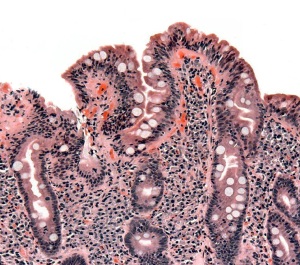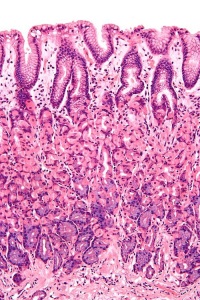How it started.
My husband asked me why we should supplement our children with probiotics if we were supposed to already have bacteria naturally in our gut. At the time, I didn’t have an answer. I just had a “gut” feeling that they were pivotal to my children’s health. I’m the type that, when faced with an unanswered question, will not stop until I have found a reliable answer. So I googled, for several hours, and then checked out a book at the library. Thanks to reading Gary Huffnagle’s Probiotics Revolution, I now know the science behind my instinct. Not only have I learned about how important our micro-biome really is, I have a clearer picture as to what was happening when my kids were sick, and it is fascinating!
Have you ever wondered whether or not a series of health issues were related? Why your children all of a sudden develop allergies and eczema? How about the biggest question as a parent, why are my child’s bowel habits abnormal? Probiotics research answers all of these questions, plus addresses why we are always fatigued, irritable, and malnourished.
To me, and if you are in the same boat here I wouldn’t blame you, it sounds too good to be true. Like one of those holistic cure-all ruses, a single explanation for the majority of health issues seems improbable. However, previous medical research has generally thought of the bacteria in our bodies as germs on a countertop; more troublesome than useful. In reality, “our microbes outnumber our own cells ten to one” (Huffnagle, 26). Their purpose? To keep our system healthy, in check, and able to heal. The fact is, for most people, it really is as simple as healing our gut.
Why Probiotics?
“Natural forces within us are the true healers of disease.”
–Hippocrates
Our gut houses microbes; specifically bacteria, parasites, and yeasts. Don’t let the names of those last two microbes frighten you because they are generally harmless in a healthy digestive tract. The bacteria can loosely be categorized into two forms, good and bad, and the good bacteria are stronger and capable of battling off the weaker bad bacteria and parasites, and keep the yeasts in check. However, bacteria need food to survive. Feed the good bacteria and everything stays in balance, feed the bad bacteria and these microbes will proliferate and cause the gut to inflame and become damaged. In essence, you really are what you eat!
Your body’s immune system has certain cells, called dendritic cells. They rush to damaged sites in the gut and identify the culprit, relaying that information to the lymphocytes. The lymphocytes become helper T cells, instead of becoming regulatory cells, to fight off the culprits that the dendritic cells have identified. They also call in the soldiers, phagocytes, to travel to the area and release toxins that kill the offending microbes. These phagocytes can damage the surrounding tissue in an area of combat if the body is not producing enough regulatory cells to tell them to calm down.
Do you see the correlation yet? Inflammation in the gut leads to the production of helper T cells and the decreased production of regulatory cells. Phagocytes t hroughout your body can start causing further inflammation and damage without the regulatory cells telling them to calm down. In a healthy micro-biome, the culprits are caught immediately, regulatory cells come along and calm the inflammatory cells, and there is balance once again. If the source of damage is not addressed, however, our immune system is thrown out of whack and we have fewer and fewer regulatory cells to quell the inflammation and damage. Unhealthy gut=unhealthy immune system.
hroughout your body can start causing further inflammation and damage without the regulatory cells telling them to calm down. In a healthy micro-biome, the culprits are caught immediately, regulatory cells come along and calm the inflammatory cells, and there is balance once again. If the source of damage is not addressed, however, our immune system is thrown out of whack and we have fewer and fewer regulatory cells to quell the inflammation and damage. Unhealthy gut=unhealthy immune system.
“During the past forty to fifty years, Americans have inadvertently performed a massive experiment by making two significant lifestyle modifications: greatly increasing our use of antibiotics and substantially changing our diet. Together, these changes have produced an invisible epidemic of insufficient probiotics. As a result, the balance of our intestinal microbe population has changed, sometimes with disastrous effects on our immune system–and major consequences for public health” (Huffnagle 40).
“When your gut is unhealthy, it can cause more than just stomach pain, gas, bloating, or diarrhea. Because 60-80% of our immune system is located in our gut, gut imbalances have been linked to hormonal imbalances, autoimmune diseases, diabetes, chronic fatigue, fibromyalgia, anxiety, depression, eczema, rosacea, and other chronic health problems” (Myers).
Though probiotics research is relatively new, the findings are all similar and powerful. For example, in 2005 Dr. Warren and Marshall won the Nobel Prize for discovering that the bacteria within the gut can both cause and cure stomach ulcers, depending on which type of bacteria predominated. In the 2006 edition of the Journal of Clinical Gastroenterology, a full panel of scientists researched and discovered the importance of probiotics in treating and preventing both diarrhea and infection, as well as their ability to improve the immune system. And now, research is discovering the direct correlation between gut and mental health.
What it means for your family.

Our job, as parents, is to provide for our children. This includes providing healthy meals. Gut health is pivotal to a thriving child, teenager, and adult. What you feed your family today determines their future mental and physical wellness. Processed and sugary foods, as convenient as they are, accomplish the opposite of this goal, contributing to depression, allergies, and longer recovery periods after infections.
Dr. Huffnagle performed an experiment where mice that have been bred without gut microbes were fed the same diet alongside mice with normal digestive tracts. They then introduced the bacteria from the healthy mice to the microbe free mice. Huffnagle found that “now that they had a microflora to assist with metabolism, their bodies could absorb more nutrients from their food. When the scientists looked more closely at what was happening in the gut, they learned that … they broke down certain dietary components that the mice’s own intestinal tracts couldn’t digest. It was as if the mice had been eating from lunchboxes that contained secret compartments with extra food–and now the microbes had opened those compartments” (Huffnagle 190-191).
Vitamin deficiency has been said to lead to a less effective immune system, neurological disorders and delays, multiple sclerosis, irritable bowel syndrome, depression, etc. The fact that probiotics can treat and prevent such conditions is valuable, if not necessary for every parent. For example, there was a study done on the effect of probiotics on children with autism. The study failed because parents withdrew their kids from the program after seeing such significant progress. They knew they were in the test group because of the evident changes and didn’t want to switch over to the control group (http://autism-nutrition.com/probiotics-for-autism).
Does this mean that you should start giving your child a probiotic supplement? Dr. Huffnagle suggests exactly this if your child is currently experiencing illness or allergies. The most important thing, however, is diet. You can take probiotics every day and sabotage the progress by ingesting the wrong foods. Therefore, I suggest a diet rich in fermented foods, like sauerkraut, kefir (my kids love this), and aged cheeses, as well as fibrous vegetables, fruit, and pasture raised, grass-fed meat free from antibiotics and hormones. Prebiotics, or foods that beneficial bacteria thrive on, are some of these. Sally Fallon Morell has a wonderful and information rich cookbook called Nourishing Traditions that has helped me navigate the waters of nourishing foods. I am currently pairing the knowledge of properly preparing food from her cookbook, with the Specific Carbohydrate Diet which Dr. Natasha Campbell-Mcbride adapts in her Gut and Psychology Syndrome book.
Garden of Life Whole Food Probiotic – https://amzn.to/2TlP0R6
Mega Sporebiotic – https://www.digestivewarrior.com/shop/megasporebiotic-60c.html?gclid=Cj0KCQiA5NPjBRDDARIsAM9X1GK_oUXb77Fd4mIYX8WHA9n3JC3VlibXTRfReC592IFPhdTDdzFG4koaAmfZEALw_wcB
Saccharomyces Boulardii Probiotic – https://amzn.to/2IFRLbZ
Works Cited
Huffnagle, Gary, and Sarah Wernick. The Probiotics Revolution. New York: Bantam Dell, 2007. Print
Myers, Amy. “10 Signs You Have an Unhealthy Gut + How to Heal It.” Mind Body Green. MindBodyGreen, LLC, 17 July 2014. Web. 4 Feb 2015.


It’s very effortless to find out any matter on web as compared to books, as I found this article at this web
page.
LikeLike
Can you recommend a good probiotic brand? My son isn’t very keen of sauerkraut. I did homemade kefir (using raw milk) for three years, he loves it, but he also have eczema and asthma. Eczema has increased lately despite no other changes in diet. We cook at home, from scratch WAPF/Paleo diet. My next quest is to remove dairy (kefir and cheeses) and go completely gluten fee to see if I could reverse eczema. I also give to him Bio-Kult, 2 caps every morning with cod liver oil. Any response would be very much appreciated! Thanks!
LikeLike
Yissell,
It sounds like you are doing a wonderful job! I would trust your maternal instincts and take dairy out. Either it helps, or rules it out as the culprit. I had to take my own son off of dairy for two years until he was recovered enough for his body to process it correctly. As for the probiotics, I personally recommend Garden of Life children’s probiotics. Their brand surpasses most that I have found in sticking with only raw and natural ingredients. Also, have you checked out coconut kefir? I’ve heard great things. A good resource is Donna Schwenk at culturedfoodlife.com. Thank you for your comment and I hope you have a wonderful night!
LikeLike
Try going Glyphosate free…this pesticide is now being used at higher levels to harvest wheat and some other crops…Glyphosate reduced good bacteria at lower levels but allowed bad bacteria survival. It also binds key nutrients within our bodies like zink so its not available to us. Its only fairly recently that legislation allows this higher level.
LikeLike
Also consider that the cows diet will impact the content of the milk. The best milk and cheese…is 100 percent grass fed. Consider that most cows may be fed GMO corn or GMO alfalfa. Most GMO crops are Glyphosate resistant so tolerate greater spray thus carry higher residue to the consumer.
LikeLike
Removing wheat was the cure to my son’s eczema. Try it!
LikeLike
I have given my daughter a probiotic since she was 2 months and she is now 10 months. Since she was 3 months her BM changed and she went only once a week which I read was normal for BF babies. I waited until she got teeth then started her on solids. Only organic fruit and veg so far as I’m paleo inclined and now her BM are once every 3 or 4 days . I feel this is too long for eating solids plus being BF still. Sometimes the stools are uncomfortable for her and I feel too firm. I have tried to up her liquids, as she doesnt go for water, with coconut water or fruit mashed into water. This helped with the firmness a little however it didnt help her regularity. I even make cooconut yoghurt from scratch with probiotic in it. The probiotic is from a practicioner, my pediatrician/chiro, and its metegenics flora care for kids. My pediatrician seems to think it’s just her digestive system adjusting however it seems strange to me. She has also never had any sort of drugs/chemicals of any kind. I had a completely drug free birth and didn’t take as much as a panadol while pregnant. Any ideas on why she has a slow digestive system????? And can this be normal? ?? Thank u
LikeLike
Kudos to you for all of the natural steps you’ve taken for a healthy baby! Out of my three, each one’s bowel habits have been a little different. Clark, however, was consistently constipated. He also retained his bowel movement when he was potty training because it was painful. What happens is that the colon becomes stretched and the only way to allow it to shrink back is for the bowel movements to be thin for a week or two. You can do this by upping the amount of liquids and high fiber foods like steamed and mashed prunes, cabbage, and home made oatmeal, buckwheat, or quinoa. Avoid all constipating foods for a little while. I also know that epsom salt is used as a diuretic and is natural. I don’t know what the dose for such a young child would be so I suggest asking your pediatrician or consulting a naturopath (maybe even searching on babycenter.com?). I hope this is the issue, as it is very common. Remember, always trust your instincts and keep an eye on how she adjusts over the next few months. You’ve already done a fantastic job!
LikeLike
If you are still BF’ing her, you might also look at your own diet to see if anything in it might be causing her issues or if you need to take/change probiotics. I am an ambassador for a health & wellness company that has a probiotic as one of its products. Several moms have commented on message boards that they took the probiotic and they could tell it was having a direct positive effect on their BFing babies.
LikeLike
Probiotics have changed my life. Message me I would love to tell you about my probictic I found.
LikeLike
I would love to hear about the probiotic you found!
LikeLike
Reblogged this on WELLNESS WITH PLEXUS and commented:
Probiotics are Pivotal to Optimal Health
LikeLike